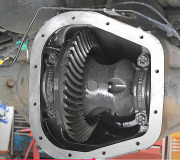About 2 weeks ago I took a trip out of town for the weekend. This was the first time that I had driven the car that for for that long (about 3 hours each direction). On the way back from this trip, about 20 miles from home I noticed that the car was making a light humming/rubbing noise when pushed on the gas. It would go away as soon as I let off the gas. I didn't think too much of it until the next day on my way to work. The noise started up about 15 minutes into my drive and just kept getting louder. I took it to Midas and they couldn't replicate the noise so told me there was nothing they could do, but the noise appeared on my way home from their shop. I went back the next day and got them to ride with me for a bit and the noise showed up. He said it appeared to be coming from the rear end of the car. We got back to the shop and he couldn't replicate the noise with the car on the rack, and even ran the car and gave it gas while on the rack and still no noise. He checked the differential fluid and said it was dark with metal shavings in it, so he suggested changing it. I agreed and he flushed and changed the fluid. On the way home the noise was gone, but this was only about a 10 minute drive. A few days later I went back to the shop because the noise had returned and was as loud as ever. He recommended a specialty shop in town that works on drive lines. I took the car to them and they couldn't replicate the noise on the road or on the rack and said that I must be imagining things, which I know for a fact that I am not.
So, to summarize, my car is making a humming/rubbing noise when I accelerate and the noise stops when I take my foot off of the gas. It seems to only happen when I am going straight or when I turn to the left. The noise seems to disappear when I turn to the right. The sound is not there when I'm in park/neutral and rev the engine and doesn't seem to change based on the rotation of the tires. I don't have a lot of money or time to get this fixed, but I'm afraid that something is horribly wrong with my car. Please advise! Thank you!
Tuesday, July 7th, 2015 AT 5:55 PM




